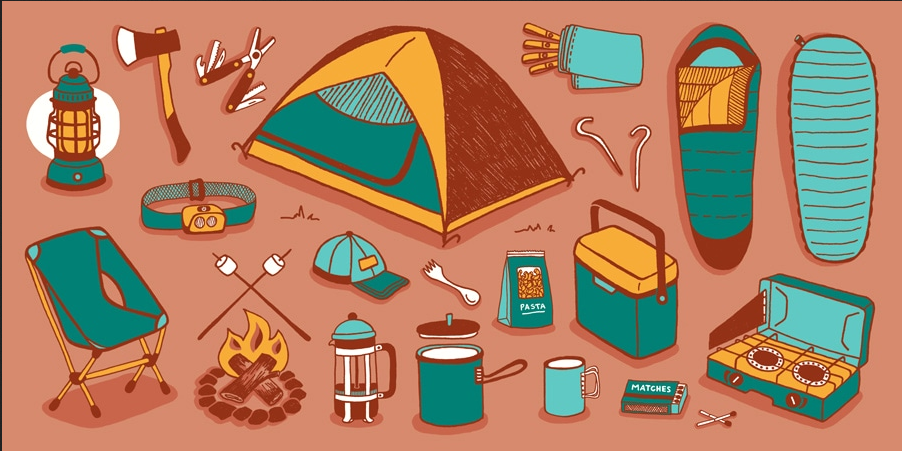A camping trip is a great way to get back to nature, enjoy some time away from the daily life’s hustle and bustle, and spend quality time with family and friends. But you have to make sure that you’re prepared for any emergency that may come up.
Firestarter
A waterproof fire starter is a must-have for any camping trip. Not only does it help you start your campfires with ease, but it also comes in handy when you’re caught in a rainstorm. The waterproofing feature means that your fire starter will still work as it should, even if you get caught in the rain.
Water purifier
You should always have a water purifier on hand when camping because it can help prevent waterborne illness. If your campsite has running water, you can use a filter bottle or cup to drink from it safely. If not, ensure that all the water you bring is properly filtered or boiled first to be safe for drinking.
First-aid kit
You should always bring a first-aid kit when camping because accidents happen more often than we expect them to. The best thing about having a first-aid kit is that it will allow you to treat minor injuries yourself instead of going through an expensive ambulance ride or hospital stay!
Insect repellent
Insect repellent is a must-have for any camping trip. It’s not just mosquitoes you need to worry about; ticks and chiggers are also common in some areas of the country. A mosquito net can be helpful if you don’t want to use insect repellent on your face or hands, but it’s unnecessary and adds weight to your pack.
Flashlight
You should also include a flashlight in your camping kit for late-night trips to the bathroom or out of your tent at night to check on wildlife. I prefer LED flashlights because they have a longer battery life than other flashlights. You can also get rechargeable batteries that will last even longer without needing to be charged.
Sunscreen
There’s nothing worse than getting fried by the sun while trying to relax. Protect yourself using sunscreen with at least SPF 30, and reapply every two hours. If you plan on spending a lot of time in the water, bring a waterproof sunscreen that can be applied on top of your regular sunscreen for added protection.
Multi-tool
A multi-tool is one item that isn’t necessary but can make life a lot easier if you have one. They come in all shapes and sizes, so it’s up to you to find the best one. My favorite multi-tool has a pair of pliers, wire cutters, knife blades, and screwdrivers. But some people prefer ones with scissors instead of wire cutters or vice versa — it all depends on what kind of camping trip you’re going on and what activities you’ll be doing while there.
Pocket knife
A pocket knife is an essential tool for camping. It can be used to cut food and open packages. It can cut twine, rope, or even a branch to make a new fishing pole. A pocket knife is also good for self-defense in a dangerous situation.
Pocket knives come in many shapes, sizes, and prices. The most important thing is choosing one you are comfortable with and know how to use safely. I recommend getting a pocket knife with at least two blades: one small blade for cutting food and opening packages and one large blade for cutting rope or branches (or for self-defense).
Toilet paper
You can get by with just about anything for toilet paper in an emergency: newspaper, leaves, even your hand. But when camping or hiking, it’s nice to have soft, clean toilet paper that doesn’t leave your butt feeling like you’ve been rubbing sandpaper on it. Plus, it takes up less space than packing a roll of TP!
Biodegradable soap
Biodegradable soap is necessary for camping. It’s one of those things that you don’t think about until it’s too late, and you’re standing in a dirty bathroom with no soap. Some of the most environmentally conscious campers have also used it for many years! We like to use Dr. Bronner’s Pure-Castile Soap because it comes in bars, which are easier to pack than liquid soap.
A tent and tarp
Tents are designed for different types of camping trips. If you are backpacking, chances are you will not want a heavy tent that takes up too much space in your backpack. Backpacking tents usually weigh between two and six pounds and pack down into small sizes, so they don’t take up too much room in your pack. If you are car camping, weight is less important than comfort and convenience. Car camping tents tend to be heavier than backpacking ones but still lightweight enough that one person can carry them on their own without trouble.
Sleeping bags and pads
For sleeping bags, choose one rated for colder weather that keeps you warm in temperatures below 40 degrees Fahrenheit. If you’re camping in warmer weather, opt for something lightweight like this Coleman bag that weighs less than 3 pounds so that it won’t add too much weight to your load.
For sleeping pads, go with a self-inflating pad from Therm-a-Rest because they are easy to use (open up the valve and watch the pad inflate) and provide plenty of comfort compared to other options, foam pads or cots (which can be bulky).
Two or three days’ worth of food per person
If you’re camping with a large group, it may be hard to go grocery shopping before the trip. You don’t want to run out of food while in the middle of nowhere! The best way to avoid this is by packing two or three days worth of food per person (depending on how long you plan on being gone). Include basic items like cereal bars, granola bars, crackers, and more filling foods like pasta and canned tuna.
Cookware and cutlery for everyone in your group
Let’s talk about cookware. Pots with lids are great because they allow you to cook one thing and keep it warm while you’re cooking something else. A frying pan and a big pot to boil water are also good ideas. You’ll also want some bowls, plates, and cups; these can be used at home and while camping. If you’re doing a lot of cooking, bring measuring cups and spoons and serving utensils like spatulas and tongs.



